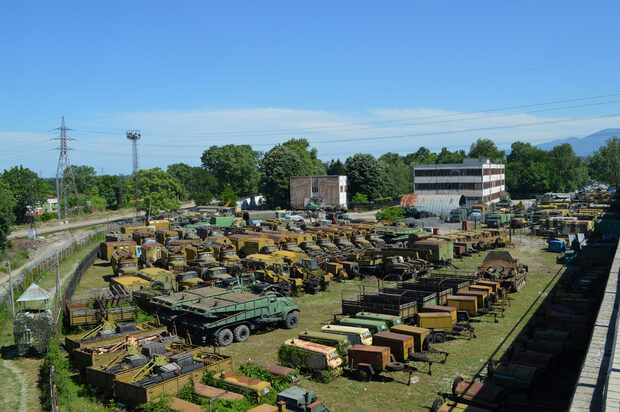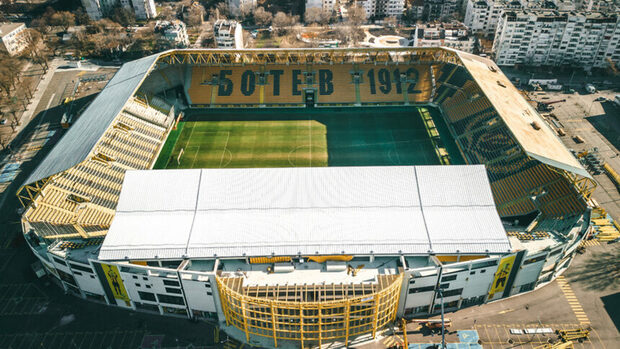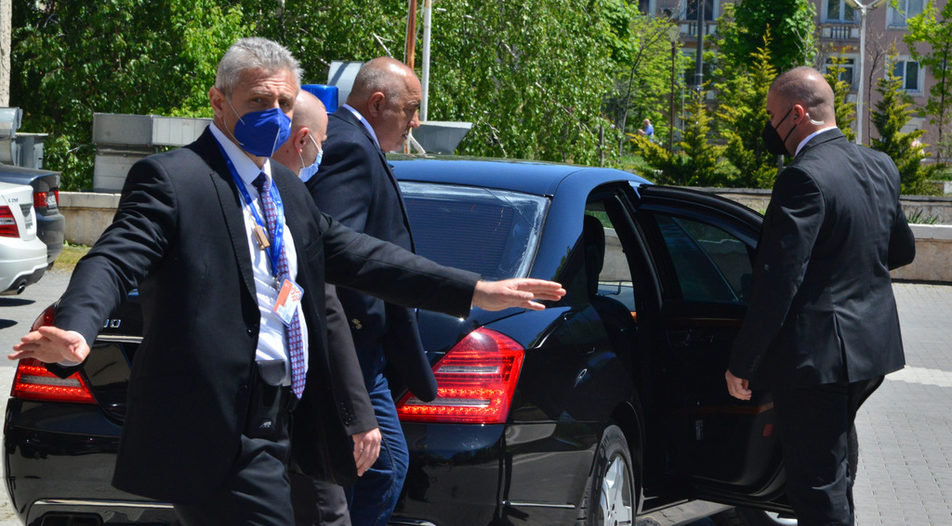For a while, the suspicion lurked that Boyko Borissov would emulate Donald Trump when he left power - by not showing up.
This week the president appointed a new caretaker government to lead the country for two months until new elections, and the subsequent cabinet, are formed. Although the caretaker government is temporary and doesn't mean that Borissov is done and dusted, it still marks the first time in 4 years that someone else will be in the driving seat.
Leaving the country to a caretaker government, appointed by his nemesis - President Rumen Radev, was the nightmare scenario Borissov wanted to avoid last year, during a long summer of anti-government protests. So what was the likelihood of him showing up for a transfer of power he obviously detested?
Yet the man in charge for the last 12 years proved again to be a cunning and smooth operator. Borissov stood next to the new Prime Minister - gen. Stefan Yanev, wished him luck "because it is very hard" and underlined that the new government was "very good".
Then he left through the side exit of the Ministerial council and journalists had yet again to rely on live streaming from his PR instead of being able to ask questions.
Given the irony of it all, it was only fitting that the new Prime Minister announced his goal was to "reveal everything about the state of the country during the previous government". This will be all but impossible in the space of two months, with elections coming and new rules for voting to be implemented.
Yet some things are bound to change.
POLITICS THIS WEEK
Start with appointments
Some key positions are easy to change if you are in control. For example, the board of the state-owned Development bank - the main vehicle for financing influential Bulgarian business owners close to the government. This can be changed rather fast by the Minister of Economy.
Or the head of Road Infrastructure Agency - the main structure for large infrastructural procurement.
Those and some more will be easy - publicly and technically - for the new government to change: both are famous tools for Borissov's government to finance companies and so it is justifiable to free them from GERB control before the next elections.
Then on with the Big plan
There is this trivial issue regarding the 6 billion euro plan for Recovery and resilience which was filed in Brussels last month. You might remember it turned into the focal point of parliament discussions, short-lived though they were. Well, the new government has plans about the plan. Or at least, they devoted a whole deputy PM to it - Atanas Pekanov, who used to be in ECB and BNB.
Pekanov will have the difficult task of dealing with a European Commission that is eager to finalize the plans, a president who wants to include some projects in it and political parties that want to have a say.
Things to watch out for: the future of "Mariza Iztok" coal complex and 800 million leva for the irrigation systems.
And probably with a little revenge
The new Interior Minister is hated by the current judicial and police establishment. Boyko Rashkov was thrown out of the Special Intelligence Means Control Bureau when he started showing evidence of widespread and uncontrolled wiretapping by the prosecution and services. Now he will probably use his time to clear up some of the biggest clogs in the system - namely some of the directors of local police directorates.
Overall, though, it's an impressive list
As almost everyone agreed this week, such a cabinet is all but impossible to create with a political coalition and mandate. There are several Harvard graduates, some old faces and some presidential advisors, but mostly it is an expert cabinet - read more here.
Remember, it is herе only for a few months, though
While everyone's busy suggesting what the new government should do, GERB are consolidating and trying to figure out a way to get back in power in the July elections. One thing Borissov did this week: he threw the mayors of Sofia and Burgas out of the Executive Committee - presumably on the back of weak results in the previous election.ECONOMICS
Meanwhile, the Agricultural sector keeps blowing up like a minefield
Several days after the explosive statements of the now-famous Svetoslav Ilchovsky, a second farmer made allegations of cartels and a racket involving businessmen close to the government.
Pavel Stoimenov, owner of Agro bel 2001 and a large land-owner, claimed a cartel of several companies, led by Gradus' owner Ivan Angelov and known as "G-8", sets the rents and land prices in Stara Zagora county. Stoimenov says he has been forced to pay lower rents to land owners and also to sell at lower prices because of threats from the "G-8". He claims some of his offices were set on fire.
Quote: "We've moved 20% of our capital out of Bulgaria, because we're afraid. And we're not the only ones."
Gradus, of course, keeps denying any of that happened and will file court cases against everyone.
On to the good news: Industrial activity skyrockets in March
Several indicators point to a significant boom in industry in March. To start with, large industrial enterprises listed on the Bulgarian Stock Exchange reported double-digit increases in sales in the first quarter of 2021 compared to the same period of 2020 when the pandemic had not yet hit Europe hard.
This week, national statistics showed that industrial firms reported a 19% increase in revenue in March compared to February 2021, and exports in March rose to a record of 5.7 billion levs for the month - a 27% increase compared to March 2020.
Part of the growth is probably due to the increase in prices of raw materials in recent months but the numbers might also point to a recovery in process. Businesses are seeing markets recover and demand is rising, and expectations for the coming months are optimistic.
Things also look brighter from Brussels
The European Commission improved its economic outlook for Bulgaria this year - the latest macroeconomic forecast shows GDP rising by 3.5% compared to 2.7% three months prior. The improvement is due to expectations for stronger demand from abroad which, in turn, would lead to an increase in goods exports.
Depending on the rate of absorption of EU funds under the Recovery and Resilience Plan, GDP growth in 2022 could accelerate to 4.7%, according to Brussels's report. This would be the strongest GDP growth for Bulgaria since before the 2008 crisis (6.1%).
BUSINESS
Telecommunications
BTCBTC has bought Ruse-based TV and internet provider Networks-Bulgaria, the largest provider in Northern Bulgaria. The purchase also includes one of the few remaining independent operators in Sofia - Online Direct, which is 100% owned by the Ruse company. The transaction must be approved by regulators, and according to BTC will be completed in the second quarter of the year. No financial details were announced.
Pharmaceuticals
TevaTeva is moving production of Sudocrem from Dublin to Troyan in 2023. The Israeli group acquired pharmaceutical plants in Troyan and Dupnitsa as part of the Actavis deal five years ago. Now, it will move production of the iconic Irish Sudocrem cream from Dublin to Bulgaria. The company has told employees in the Dublin suburb of Baldoyle that it plans to close the plant by the end of 2022, which will lead to the layoff of 110 workers there, Irish media reported. The information was confirmed for "Capital" by the Bulgarian "Teva Pharma".
Manufacturing
Esetere BulgariaENERGY
A little bit of honesty: Greek connection is far more important than Turkish Stream
The Energy and Water Regulatory Commission acknowledged that Bulgaria is losing out from prioritizing Turkish Stream instead of the Greek connection. "Bulgaria suffers huge losses because the connection with Greece has not been built. It is unfortunate that in all likelihood it will not be ready by the end of this year, as promised," stated EWRC chairman Ivan Ivanov in parliament, where he was invited to a hearing last week.
"It is unacceptable to have slowed down the interconnector in this way; nothing was done in the first 5-6 years," added Ivanov.
Which might turn out to be quite important: if Russia adds Bulgaria to its "unfriendly" list and cuts supplies, we'll still be as helpless as exactly 13 years ago, when GERB first came to power.
Bulgaria and Greece link energy exchanges
The energy exchanges of Bulgaria and Greece have united in the "Day Ahead" segment. In practice, traders in both countries can see and bid for the same offers. This means that the price of electricity is the same for both markets. The single trade between Athens and Sofia is the first step towards pan-European unification, which is expected to take place in October. Then any doubts about manipulations of the price of electricity will disappear, as local players will not be able to have any impact on supply and demand.
VIDEO OF THE WEEK:
People:
Kiril Petkov
The Harvard-educated economist is the new Minister for Economy and apart from overseeing the Development bank and the COVID-money for business, he has already proposed some ideas to put in the Recovery plan.Miroslav Borshosh
The old face from Sofia's small but influential elite keeps popping up in various places: he has been a politician, turned businessman, turned producer, turned CEO of the National Palace of Culture (where he was sued and acquitted for mismanaging cash flows) and now is the new deputy mayor of Sofia for culturePlaces:
Rome
another destination which the low-cost WizzAir plans to reinstate from Sofia now that things are slowly starting to go back to normality.Furmi - Dates.
The most famous fruit these days, after Gradus' boss Ivan Angelov testimonials. It turned out that he doesn't know if or why his company paid for a special flight to Dubai during the pandemic last year. The flight was full of food and contained a minister on board.
It was supposed to return with medical supplies, but instead it returned full of.. dates. While Angelov got confused explaining why or how all of this happened, it is worth noting two things.
First, it is always a bad idea to mix governmental and business affairs. One or the other ends up suffering.
And second, this is not the first time Bulgaria got dates instead of something else from the Middle East. Back in the 70s, Iraq paid part of its debt to Bulgaria in dates. The records show that they were turned into rakia.
For a while, the suspicion lurked that Boyko Borissov would emulate Donald Trump when he left power - by not showing up.
This week the president appointed a new caretaker government to lead the country for two months until new elections, and the subsequent cabinet, are formed. Although the caretaker government is temporary and doesn't mean that Borissov is done and dusted, it still marks the first time in 4 years that someone else will be in the driving seat.
Read More












